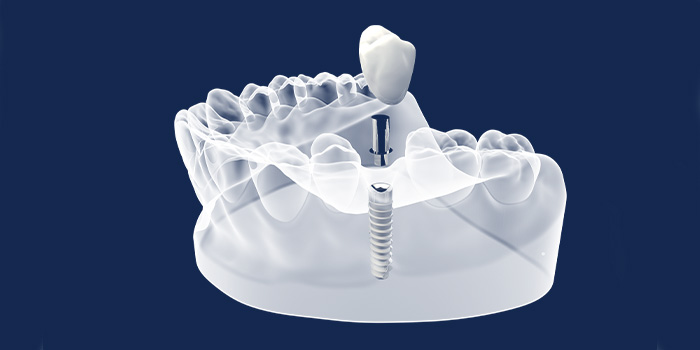July 30, 2019
Dental implants replicate the feel and function of a natural tooth where one or more teeth are missing. They are made up of three components; a titanium post, an abutment and a dental crown.
To start, a titanium post is surgically placed into the gums where the missing tooth is located. Here, the post effectively acts as an artificial tooth root.
After 2 to 6 months of healing an abutment is placed into the titanium post which secures the adjoining dental crown. At this stage, your dental implant will look and feel like a natural tooth would and your ability to chew normally will return.

Treatment Suitability
At an initial consultation, your dentist will take 3D OPG scans to determine if dental implant treatment is viable. The scans will show if there is sufficient healthy bone mass to proceed with treatment. As well, they will discuss other available options, pricing and your objectives.
For cases where there is limited bone mass, a bone graft may be required to provide additional support for the implant post. Your dentist will be able to tell you if you are a viable candidate for dental implant treatment.
Types of Dental Implants
There are several different types of dental implants available to suit a host of cases. They are:
Implant Crowns
Implant crowns are used to replace a single missing tooth. After the healing process, an abutment is either screwed or cemented into the titanium base and adjoining dental crown.
Implant Supported Bridge
For patients missing two or more teeth in a row, an implant supported bridge may be a suitable solution. The bridge is either supported with two dental implants on either side, or with one dental implant and one dental crown.
All-on-4
For patients missing all their lower or upper teeth, as little as 4 dental implants may be required to support a full arch.
Full Arch Implant
In cases where all-on-4 restorations are not compatible, a full arch implant may be suitable instead. On average 5 to 8 implants are placed to support a full arch restoration.
Overdenture
Dental implants can be used to secure removable dentures. Only a few implants are required to stabilise an overdenture in the jaw.
Dental Implant Longevity
Dental implants are notoriously known for being a long-lasting solution for missing teeth. This is because they can last indefinitely if they are looked after properly and there are no complications. This means, attending 6-monthly check-ups, brushing twice daily, flossing daily and not smoking.
Damages to the dental crown or loosening of the abutment are the main causes for influencing this estimate.

Dental Implant Treatment at Coastal Dental Care
Dental implant treatment helps to maintain bone structure and can also help to create a fuller appearance. When teeth are left missing for extended periods of time, it can impact the health of your jaw and surrounding teeth.
If you would like to learn more about our dental implant treatments, contact one of our friendly practices today. Alternatively, you can book an appointment online 24/7!

